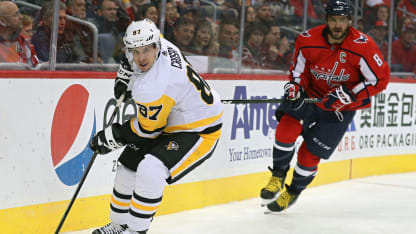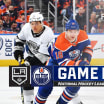The argument about who is better has raged since Sidney Crosby of the Pittsburgh Penguins and Alex Ovechkin of the Washington Capitals joined the NHL together for the 2005-06 season; Ovechkin a prototypical power forward with the skill set to become a perennial 50-goal player, Crosby the silky smooth center capable of taking the torch from Mario Lemieux as Pittsburgh's greatest player.
Crosby vs. Ovechkin debated by NHL.com writers
Penguins center, Capitals forward to face off in playoffs for third straight season

© Patrick Smith/Getty Images
By
NHL.com @NHLdotcom
RELATED: [Five key matchups for Capitals vs. Penguins | Burakovsky could return during second round | Ovechkin on defeating Penguins in playoffs: 'One day it has to happen']
A dozen seasons later, the head-to-head battle remains as fierce as ever.
Ovechkin won the Calder Trophy, beating Crosby, as the League's best rookie in 2006. He has won the Rocket Richard Trophy as the League's top scorer seven times, including this season. He has 607 regular-season goals, second among active players to Jaromir Jagr (776).
Crosby, meanwhile, has won the Stanley Cup three times, won the Rocket Richard twice and the Art Ross, as the League's leading scorer, twice. His 1,116 regular-season points are sixth among active players, six fewer than Ovechkin, who has played in 139 more games.
This is their fourth meeting in the Stanley Cup Playoffs; Crosby and the Penguins have won each of the first three on the way to three Stanley Cup titles. Two of the series went to seven games and another to six. Crosby and Ovechkin have waged their own personal battles in the playoffs as well.
Who can forget the dueling hat tricks between Crosby and Ovechkin in Game 2 of the 2009 Eastern Conference Quarterfinals, a game the Capitals won 4-3.
In the 20 playoff games in which they have gone head to head, Crosby has 12 wins and 22 points (12 goals, 10 assists), Ovechkin has eight wins and 28 points (14 goals, 14 assists).
As they prepare to face off in the 2018 Eastern Conference Second Round, a panel of NHL.com writers weighed in on which player is better at this point in their careers. Here are their responses:
Shawn P. Roarke, Director of Editorial
This is a tough question. In the end, it is a question about which player is better, not which player or team has had more success. Crosby wins the latter in a landslide. Ovechkin, though, wins the former by a hair.
I know it is an unpopular decision as Crosby has the Stanley Cup rings as well as the international success with Canada. But, I would argue that Crosby has gone into each matchup against the Capitals with more talent at his disposal and more opportunity to influence the game.
Look at the 2015-16 matchup. Crosby was limited to two assists and the Penguins won in six games. Ovechkin had two goals and five assists in that series and was the dominant player. He just didn't have enough help.
There are five active left wings who have played at least 1,000 regular-season games. Ovechkin has 607 goals in 1,003 games. Rick Nash has played 57 more games yet scored 170 fewer goals. Ovechkin's average is 1.12 points per game. His closest competitor (minimum 500 games) among left wings is Taylor Hall of the New Jersey Devils at .89
Crosby has played 864 NHL regular-seasons games, losing the majority of two seasons to a series of injuries. He has 1,116 points (411 goals, 705 assists) in those games. His No. 2 center, Evgeni Malkin, has 930 points (370 goals, 560 assists) in 80 fewer games. Crosby's regular-season points-per-game average is 1.29, Malkin's is 1.19. In the playoffs, Malkin has two fewer goals than Crosby in 154 games -- a virtual dead heat. When you throw in Phil Kessel and the emerging Jake Guentzel, who has 19 goals in 31 postseason games, it's clear Crosby has considerably more help.
For those reasons, it is Ovechkin for me, by the slimmest of margins.
Tom Gulitti, Staff Writer
Shawn makes a solid case for Ovechkin, and I agree the comparison between Crosby and Ovechkin is closer than many think. The common, and mostly unsupported, knock on Ovechkin is that he doesn't produce in the Stanley Cup Playoffs, but in 103 postseason games he has 98 points (51 goals, 47 assists) for an average 0.95 points per game.
There are six active players among those who have played at least 50 playoffs games with higher points-per-game averages: Crosby (1.15), Malkin (1.05), Nikita Kucherov (1.04), Patrick Kane (0.97), Jaromir Jagr (0.97) and Ryan Getzlaf (0.96). Among active players, only Kucherov (0.54) has a better goals-per-game average in the playoffs (minimum 50 games) than Ovechkin's 0.50 and Ovechkin is tied for 15th in NHL history (with Rick Vaive and Reggie Leach) in that category.
Of course, the active players ahead of Ovechkin have all played in a Stanley Cup Final, and he's yet to advance to beyond the second round. Like Shawn said, that can be attributed at least partly to the supporting cast around Ovechkin, but he has played for some strong teams, including three that won the Presidents' Trophy, that weren't able to get over the hump.
Crosby has shined brightest on the biggest stage, winning the Conn Smythe Trophy each of the past two seasons. He is a big-game player who can score goals (0.41 goals per game) and set up others. Only Jagr (123) has more postseason assists among active players than Crosby's 114. As a center, he has a bigger impact on the game and because of that and his ability to make others around him better, I'll take Crosby by a hair in this debate.
Dan Rosen, Senior Writer
For me, this comes down who can impact a game more, and it's Crosby.
Ovechkin is a Hall of Fame player but he's hurt in this debate by the position he plays.
Crosby is a center. Ovechkin is a left wing. The center always has more of an impact on the game than the winger because the center does more in all areas of the ice. Nobody impacts a game quite like Crosby. Connor McDavid is close, but it's hard to say he's there because the Edmonton Oilers haven't had sustained success.
Crosby hates the term, but he's the best grinder in the game. It's a term of endearment, because he does his best work in the hard areas of the ice, below the goal line. His ability to score and set up scoring plays from below the goal line is second to none.
But it's not only on the offensive end. Crosby is underrated for his defense and awareness. Penguins coach Mike Sullivan never shies away from best-on-best matchups with Crosby because he believes that Crosby is one of the top defensive forwards in the game.
Crosby is never in the conversation for the Selke Trophy, but he should be. He was sixth among centers this season with a 55.72 shot-attempts percentage. He won the second most face-offs in the League (1,026) and was 53 percent overall.
The numbers and championships and trophies aside, Crosby is simply the best overall player in the world.
Nicholas J. Cotsonika, Columnist
Crosby is the best player, period. But this debate always has been unfair to Ovechkin. It is a poor comparison that diminishes one of the greatest players of all time.
As my colleagues have pointed out, Crosby has impacted the game in more ways, and has been in position to do so. Crosby's a center, Ovechkin a left wing. Crosby has had a stronger supporting cast, even though Ovechkin has been on excellent regular-season teams.
Ovechkin will buy in to win. He sacrificed offensive numbers and blocked shots under coach Dale Hunter. He moved to right wing under coach Adam Oates. But he can't control his GMs, coaches or teammates, and he has been at his best when accepted for what he is: a goal-scoring left winger.
The game comes down to scoring goals, and Ovechkin has been the best by far in an era when it has been hard to score.
Since entering the NHL in 2005-06, he has scored 607 goals, 196 more than anyone else; 374 even-strength goals, 90 more than anyone else; 229 power-play goals, 96 more than anyone else; 22 overtime goals, six more than anyone else; and 102 game-winning goals, 26 more than anyone else.
He has averaged 0.61 goals per game, 0.09 more than anyone else who has played at least 150 games. He has averaged 0.50 goals per game in the playoffs, 0.05 more than anyone else.
Why isn't that enough?

















